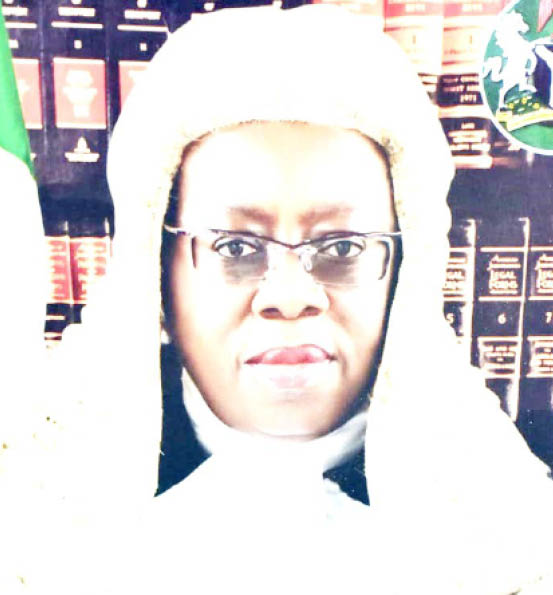NJC suspends 2 judges, retires 2 others over misconduct, age falsification
The National Judicial Council (NJC) has suspended judges of High Courts in Anambra and Rivers states, retired two others and considered reports against others for various judicial misconduct. The decision of the NJC was reached after its 107th meeting on November 13 and 14, presided over by the Chief Justice of Nigeria, Justice Kudirat Kekere-Ekun. […]

chief justice of nigeria, justice kudirat kekere ekun
The National Judicial Council (NJC) has suspended judges of High Courts in Anambra and Rivers states, retired two others and considered reports against others for various judicial misconduct.
The decision of the NJC was reached after its 107th meeting on November 13 and 14, presided over by the Chief Justice of Nigeria, Justice Kudirat Kekere-Ekun.
A statement signed by the Deputy Director of Information of the NJC, Kemi Babalola-Ogedengbe, a lawyer, specifically named Justice G.C Aguma and A.O Nwabunike of Rivers and Anambra states as being suspended from performing judicial functions for one year without pay and placed on watch list for two years thereafter.
The council also recommended two heads of court: the Chief Judge of Imo State, Justice T.E. Chukwuemeka Chikeka and the Grand Kadi of Yobe State, Kadi Babagana Mahdi, for compulsory retirement over age falsification.
- Lagbaja: PAP Boss Condoles With Tinubu, Ribadu, Minister, Defence Chiefs
- Foundation partners Nasarawa govt to enrol 750 women, children into health insurance
According to the statement, Justice Aguma was indicted for aiding a litigant who obtained a judgement at the Federal Capital Territory (FCT) High Court, Abuja and filed a garnishee against the judgement debtors in the Bori Division of the Rivers State High Court after the judgement was delivered on July 15, 2020 and registered in the state on July 16, 2020.
“The Council further finds that the speed with which Justice Aguma took and granted the order against the judgement debtors showed that he had an interest, especially as he failed to take into consideration the stay of execution of the judgement granted in favour of the debtors by the Bwari High Court, which had been brought to his attention,” the statement reads.
In the case of Justice Nwabunike, the NJC indicted him for a breach of Rule 3.1 of the Revised Code of Conduct for Judicial Officers of the Federal Republic of Nigeria, 2016 and failure to follow the principle of stare decisis from his different interpretation of the word “aspirant” and “abused his judicial powers by granting ex parte orders without a Motion on Notice filed along with the Originating Summons.”
For Justice Chikeka, the Council recommended him to the Imo State governor for retirement with effect from October 27, 2021 and a refund of the excess salaries and allowances received thereafter.
The NJC noted that he was found to have presented two different dates of birth of October 27, 1956, and October 27, 1958, and while 1956 appeared to be the consistent date of birth, in 2006, he swore an affidavit to change the date to October 27, 1958.
Similarly, the Council indicted Kadi Mahdi for having three different dates of birth (10 December, 28 January and July) all in 1959, while his actual date of birth was 1952.
“The Council held that Grand Kadi Mahdi committed an act of misconduct in violation of Rule 02908 (i) and (ii) of the Public Service Rules, 2021 and ought to have retired from service 12 years ago.
“The Council, therefore, resolved to recommend Kadi Babagana Mahdi for compulsory retirement to the governor of Yobe State and that he should refund all the salaries and allowances received for the past 12 years.”
The NJC also cautioned Justice I. A. Jamil of Kogi State to be more circumspect in handling sensitive matters in the future and the state Chief Judge J.J Majebi for assigning a sensitive matter to a junior judge on the bench.
The Council also deliberated on four petitions against Justice Peter O. Lifu of the Federal High Court, Abuja and found that the petitions were not substantiated in any form
The Council recommended 36 judicial officers for appointment by their various state governments thus: eight in Oyo State; four in Kebbi, seven in Sokoto, six in Akwa Ibom; seven Kadis of the Sharia Court of Appeal in Sokoto, two in Kebbi and two customary court judges in Oyo State.
The Council equally considered the report of its Preliminary Complaints Assessment Committee, which considered a total number of 30 petitions, empanelled six committees for further investigation while dismissing 22 for lacking in merit and two for sub judice.
